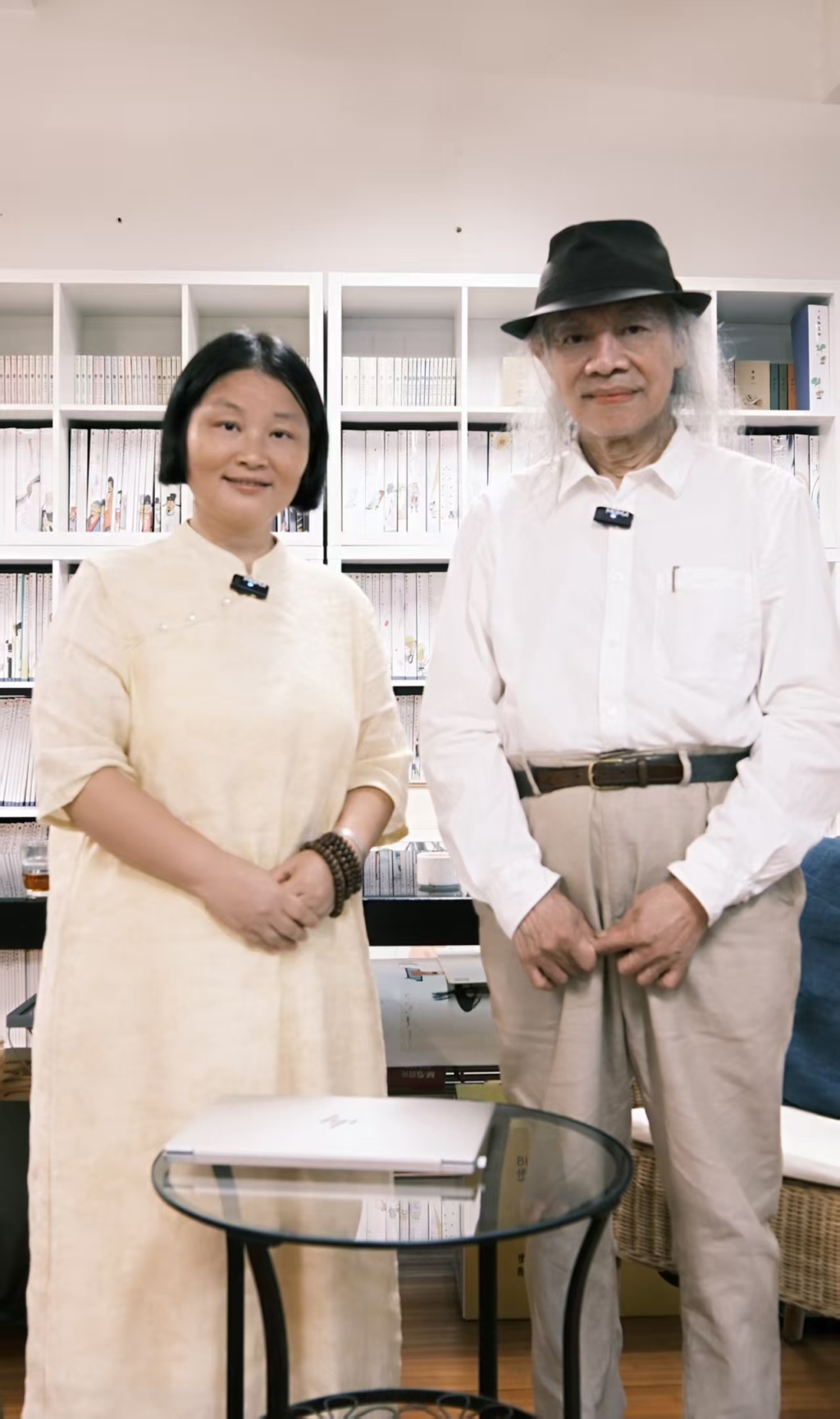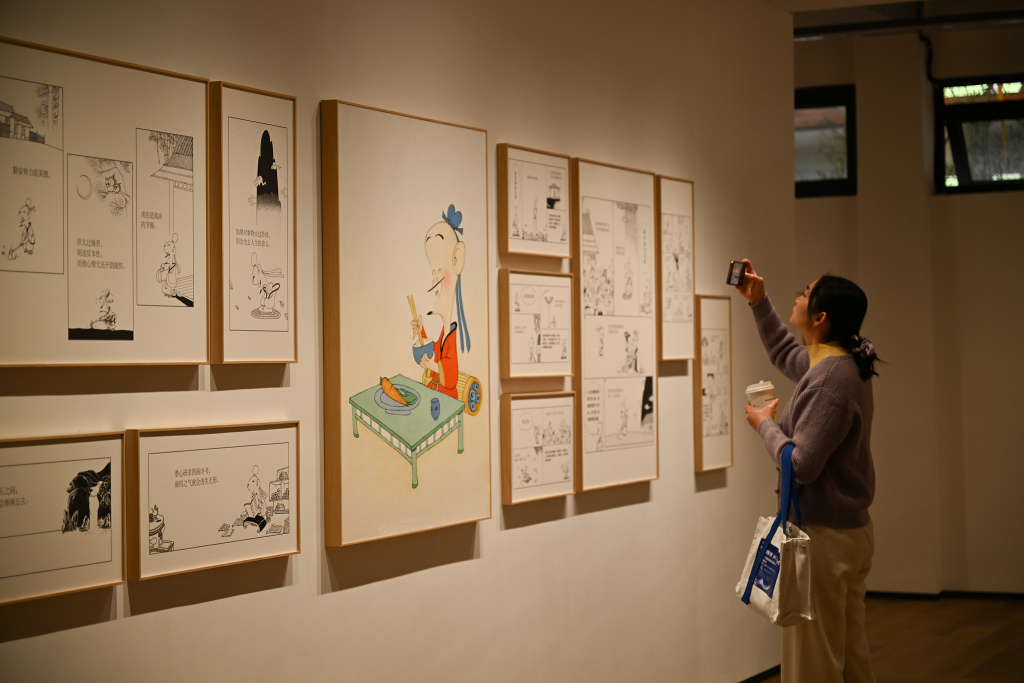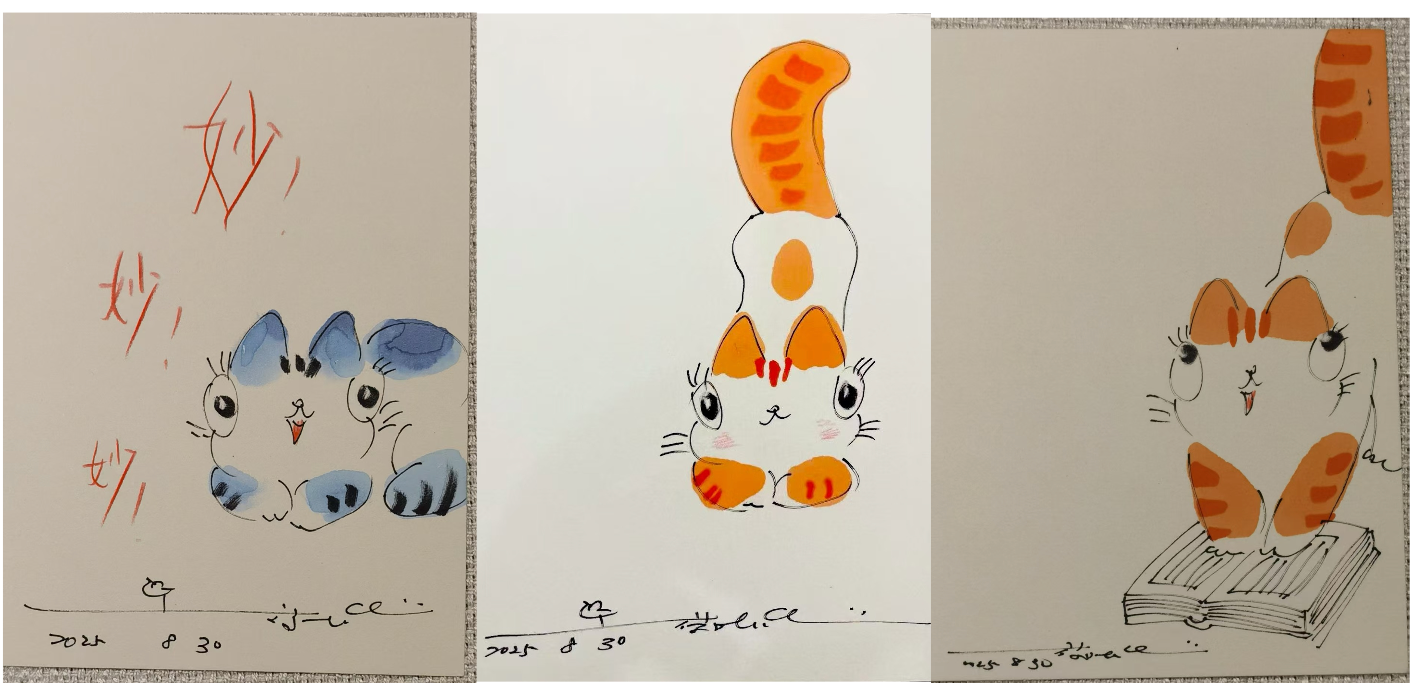
A pen can bring a life of freedom. In the eyes of 77-year-old Tsai Chih-chung, the world of thought seems to be a harmonious tapestry. He goes to bed at 4 p.m. and wakes at 8 p.m. daily, sleeping only four hours and working 18 hours. In this interview, he said, "I enjoy solitude and am very self-disciplined. I was born in Changhua and will die in Hangzhou," which reminds one of the famous Tang Dynasty saying, "One should die in Yangzhou."
Tsai Chih-chung's life can be described as legendary: he was born in a poor countryside in Changhua, without a prominent background, no academic qualifications or diplomas, but he started taking science classes at the age of one, set his life ambitions at the age of four, and was invited to Taipei to be a cartoonist after sending out four pages of comics at the age of 15. His life was spent on one painting, and the young boy in front of the desk has become a man in his seventies, with flowing silver hair and a soft voice.
His comic book series "Chinese Thoughts" has been translated into 27 languages, published in 62 countries, and has sold over 60 million copies worldwide.
In recent years, Tsai Chih-chung has lived a remarkably simple life: he owns no watch, no cell phone, and he avoids socializing. He spends less than 20 yuan a day, goes to bed at 4 p.m. and wakes up at 8 p.m. 365 days a year, sleeping only four hours and working 18. He sees wealth as a tool to achieve his ideals, not the primary goal of his life. He finds joy in doing what he loves; pursuing his passions to the extreme, delving into them to discover their true meaning—this is his true nature.

The author of this article and Cai Zhizhong (right)
His detachment from material things and his focus on painting make Tsai Chih-chung stand out from the crowd. Even more remarkable is that on September 3, 1998, at the height of his creative career, he stopped and secluded himself for 10 years and 40 days to study mathematics and physics. He also told us: A mathematical method that holds true from one to infinity is the truth. In his "Eastern Universe Quartet," we can see Tai Chi and the trajectory of the ten directions of the world, like the courage to drill through everything and face everything like an electric drill. Even mathematical expression, in Tsai Chih-chung's work, is a natural expression of Eastern thought. Shen Changwen, general manager of Sanlian Publishing House, once said: "Tsai Chih-chung's greatest contribution is to make 1.3 billion Chinese people pay attention to their own culture again."
He sits and thinks for half an hour every day, and has continued this throughout his life; he can draw 800 pictures a day, each subtly different; he once sat on a chair to draw for 58 hours, with his waist and legs at 90 degrees; he once did not open the door for 42 days, and drew 29 books in 2016; he started his company at the age of 28, and in 49 years, he has never lost his temper, never fired an employee, and does things that his subordinates cannot finish or do, including personally calling to apologize; he is often deeply immersed in things that interest him.

On November 18, 2024, the Xixi Traditional Culture Art Museum (Cai Chih-chung Art Museum) located in the Xixi Wetland in Hangzhou, Zhejiang Province, officially opened to the public. The museum covers an area of approximately 3,302 square meters and houses more than 400 of Cai Zhizhong's comic masterpieces. (Photo by Wang Gang, China News Service)
He possesses a kind and gentle nature: he speaks with a calm, unhurried manner. Upon seeing three children visiting, he drew three cat pictures for them. Using only ballpoint pens, markers, and colored pencils, his simple tools don't prevent him from creating the most moving drawings: vivid and full of life, they exude an ink-and-wash effect. The composition, weight of the lines, and the color palette are all eye-catching.

Cai Zhizhong drew three cat pictures for the children on the spot.
He predicted he would die at 2:30 p.m. in the spring of his 85th year. He's already 77 this year, and it seems he only has seven or eight years left. He's currently pursuing his final work in education and culture: spreading his ideas through comics, animation, and the internet. Having benefited greatly from the classics of various schools of thought, he decided to plant this tree before his death, so that future generations can enjoy its shade, admire its flowers, and enjoy its fruit. Time flies, and so do his daily interactions with others. For him, day after day, he begins well and considers the end.
Tsai Chih-chung is a master at having fun. It seems that having fun is the ultimate art of life, and it also seems that he spends his life having fun to the fullest. He is a well-known bridge champion. He won the first place in Asia in 2006 and has 125 championship and runner-up cups at home. He is also good at calendar calculation. He calculated in seconds what day of the week July 25th was 40 years ago. On the day after the Chinese Valentine's Day in the seventh year before last, his disciples came to meet him. He only gave him half an hour, but gave me nearly two hours. He even performed a magic trick with us: a box of playing cards, after shuffling the cards several times, guess the card that the other party drew or thought of. He performed it four times on the spot, and each time his prediction was extremely accurate. The last time, he even accurately predicted the order in which the other party collected the cards. The perfect performance made everyone in the audience convinced and amazed! We were already stunned. At this time, he asked softly: "Am I better than Liu Qian?"
【Q&A】
Q: When you founded Dragon Cartoon Company in 1976, you were only 28 years old. You filmed feature-length animated films such as "Old Master Q". Was there any special reason at that time?
Tsai Chih-chung: At that time, the comic book "Old Master Q" was already selling very well in Hong Kong, and a film company found me and wanted to make it into a movie. I spent a month and a half watching all the Hong Kong movies in Taiwan. As soon as the movie was released, it became famous in Taiwan, and there were long queues in every cinema. The total box office of "Colorful Cartoon Old Master Q" reached NT$73.5 million, setting a new record for Taiwan's film box office. In the same year, it won the Golden Horse Award for Best Animation. At that time, the Golden Horse Award had been dominated by Hong Kong films for more than ten consecutive years, so I was also elected to the "Taiwan Top Ten Outstanding Youth Award".
Q: Looking back at the year 2025, what kind of nourishment do classics provide to your life? What do classics mean to you?
Tsai Chih-chung: I'm extremely thirsty for knowledge and possess a profound curiosity about the unknown. Before I begin writing, I always spend a long time reading. I love Zhuangzi, Laozi, the I Ching, and the Book of Songs. Only after truly understanding the essence of ancient Chinese culture and integrating it all do I start drawing comics and publishing them. From Confucius and Mencius to Laozi and Zhuangzi, from the Records of the Grand Historian to the Buddha, from Tang poetry to Song lyrics, from the Three Kingdoms to Water Margin, I've illustrated every classic of Chinese culture. I'm the Chinese author with the most sold and most published books in history.

Works by Tsai Chih-chung

Works by Tsai Chih-chung
Q: After studying mathematics, what do you think of this classic subject?
Tsai Chih-chung: Truth must be described through mathematics, and mathematics is the language used in the kingdom of truth.
Q: You decided at age 4 to make a living as a painter. At 15, you moved to Taipei to pursue your career. After earning your salary, you sent money home and wrote a letter to your father, saying, "I want to be not only the most famous cartoonist in Huatan Township, but also the best cartoonist in Changhua County, Taiwan Province, and all of Asia."
Tsai Chih-chung: Now I am the most influential cartoonist in the world. If a person chooses what he is best at and what he likes most, and does it to the extreme, no matter what he does, he will succeed!
Question: What role does setting goals play in life? Does it give you self-motivation?
Tsai Chih-chung : There are only three things in life: 1. What do you want to be? 2. Why do you want to be? 3. How do you want to be? The most important thing in life is to clearly know what you want, how to do it, and how to do it well.
Q: When Japanese anime swept the world, you used Chinese classics as the themes for your paintings, and used your own style to awaken people's love for classics. Does an artist's creation also shape the artist himself?
Tsai Chih-chung: Definitely. Comics are a language, a means of expression. Comics tell stories through images, and the story is the primary focus! The subject matter is what matters most! Reading classics doesn't necessarily require donning Hanfu (Chinese traditional costume) or holding a thread-bound book; it's about being able to apply it to your daily life.
Question: What kind of work is considered a good work?
Tsai Chih-chung: Many artists create works that they are very satisfied with, and pile them up in their studios, enjoying themselves and admiring them alone; but good works actually make everyone happy, and everyone is willing to collect them. It is not the kind of sales that are generated by traffic, but the kind of sales that are truly recognized by everyone.
Q: Your art revolves around classics, and you've long associated yourself with sages and saints, saving you the troublesome path many other artists take. What does art mean to you?
Tsai Chih-chung: Painting is my greatest love in life, and I found myself very early on.

Guanyin painted by Cai Zhizhong
Q: Your life is also very legendary. You were a Catholic in your early years and later a Buddhist. What do you think of these different choices of faith?
Tsai Chih-chung: All religions encourage good. Refrain from all evil, practice all good, and purify your mind—this is the teaching of all Buddhas. Your heart is your temple, your body your training ground. You are your own god, and you are also your own devil. You determine your own world; we ourselves decide whether we are in heaven or hell.
Q: You once said that you wanted to complete the last 500 books in your life. How is that going?
Tsai Chih-chung: With the help of today's AI technology, we can now quickly complete 3,000 AI comics.
Q: Do you feel lonely? What does life mean to you?
Tsai Chih-chung: Picasso said that there is no such thing as loneliness. I enjoy solitude and am very self-disciplined. The first thing I do when I wake up every day is spend 15 minutes thinking and asking myself four questions:
1. What is the purpose of my coming to this world?
2. What do I want to accomplish this year?
3. What do I want to accomplish recently?
4. What do I want to accomplish today?
I was born in Changhua, will die in Hangzhou, and be buried in Shaolin Temple. I'll even have a party a week before I die. My epitaph will read: Love what you can do, enjoy what you do.